Identity Review | Global Tech Think Tank
Keep up with the digital identity landscape.
The world’s largest cities are undergoing transformative changes as they embrace the implementation of AI technologies, propelling them towards futuristic and smart city status. Through the integration of AI, these cities are optimizing their urban infrastructure, transportation systems, and public services to enhance efficiency and sustainability. By harnessing the power of AI, these cities are unlocking innovative solutions and data-driven insights to address complex urban challenges and provide a higher quality of life for their residents.
Here are 10 trendsetters for AI developments within their cities:

Singapore is a clear example of a futuristic city, with its national AI strategy actively harnessing AI in key sectors, focusing on healthcare, manufacturing, and cybersecurity. Singapore is committed to the human-centric and ethical use of AI, as evidenced by its unique definition of “human-centricity” and the creation of the Model AI Governance Framework to implement ethical principles. Singapore stands as a highly developed global hub for entrepreneurship. This vibrant startup environment has solidified Singapore’s position as a prominent player in the global innovation landscape, attracting top talent and fostering a culture of innovation with AI.
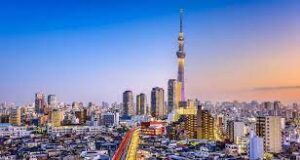
Tokyo is utilizing AI for various purposes, including transportation management, disaster response, and healthcare. The city has developed AI-powered systems to analyze traffic patterns and optimize public transportation routes. It also uses AI in earthquake prediction and early warning systems. Tokyo’s margin as the largest city in the world continues to grow, and in order to keep with its heavy congestion and risks of natural disasters for over 37,000,000 citizens, the city is forced to turn to more advanced technological infrastructures with the help of AI.
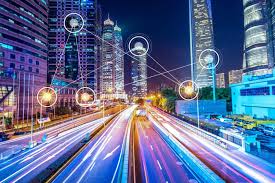
Seoul’s e-governance system is highly regarded as the world’s most advanced, offering comprehensive online government services, access to extensive databases, and opportunities for electronic citizen engagement. The Seoul Metropolitan Government committed to deploying 50,000 IoT(Internet of Things) sensors across infrastructure like bridges, roads, railways, and buildings. Additionally, they installed CCTV cameras with advanced communication capabilities to automatically notify authorities of potential hazards.
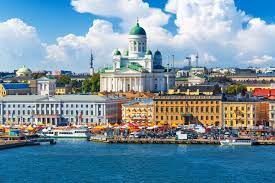
Helsinki has become a futuristic city in regards to their sustainability. Helsinki is focusing on AI to improve public services and citizen engagement. The city uses AI-powered chatbots and virtual assistants to handle citizen inquiries and provide personalized information. Helsinki also employs AI algorithms to analyze data and optimize the use of resources in areas such as transportation and energy.
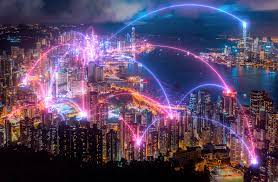
Hong Kong has grown into a smart city in multiple different sectors. Businesses in Hong Kong’s healthcare industry utilize AI to help manage data. In Hong Kong, the Electronic Health Record Sharing System (eHRSS) stores and sends patients’ medical data among healthcare providers. AI is key in law enforcement with the use of facial recognition and license plate detection. The Hong Kong government launched the LeaveHomeSafe mobile app, to monitor citizens compliance with pandemic measures and laws by using big data analytics and AI technology.
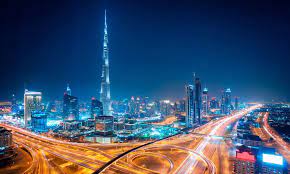
When it comes to the infrastructure of a future city, look no further than Dubai. Dubai uses AI-powered systems for traffic management, crime prevention, and healthcare services. Dubai’s police force utilizes AI algorithms to predict and prevent crimes, while its healthcare sector employs AI for diagnostics and personalized medicine. Minister of State for Artificial Intelligence, Omar Sultan AlOlama states, “Its use in various sectors including education, health care and well-being holds major potential for improving development, productivity and driving a transformative shift in strategic sectors.” Dubai is growing very fast at the hands of AI.
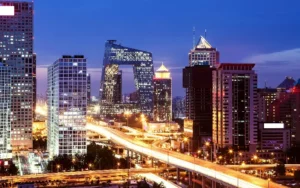
Beijing, the capital city of China, is making significant strides in its journey towards becoming a futuristic city. It has introduced the Beijing Citizen Social Service Card, a virtual card that integrates various information and simplifies access to public services for residents. In terms of transportation, Beijing has developed a real-time simulation road network model to identify and address congestion points, optimizing urban traffic flow. The city has also witnessed the emergence of its first AI-powered hot pot restaurant, where the entire process is handled by a smart unmanned system.

With Silicon Valley nearby, San Francisco has become a leader for American cities implementing AI. The startup space has given way to multiple promising AI companies. AI is used for optimizing traffic flow and introducing contactless payment systems and bike-sharing programs to improve transportation. The city has also focused on improving energy efficiency in buildings through retrofitting with energy-saving technology. Leveraging IoT technology, San Francisco monitors air quality, enhances city services, and ensures intelligent surveillance to address security threats promptly. The city promotes electric vehicles with an extensive network of charging stations and employs smart street lighting that adjusts brightness based on various factors. Additionally, San Francisco has implemented a smart waste management system and actively promotes renewable energy to reduce carbon emissions.
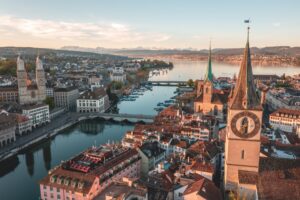
Zurich’s first step into the future came with streetlights. Since 2017, smart streetlights reduce energy by 70 percent by changing levels of illumination. The streetlight poles can also charge electric vehicles, collect environmental data, analyze traffic flow and provide Wi-Fi. Zurich also has many buildings that only utilize renewable energy. The city also implemented an app that updates people on traffic times and finds the most efficient routes.
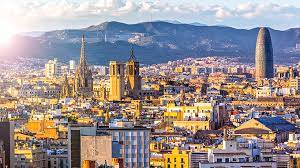
Barcelona employs AI in its transportation system to optimize traffic flow and improve public transportation efficiency. AI-powered analytics are used to optimize waste management by determining the most efficient collection routes. Barcelona utilizes AI-driven algorithms in energy management systems to monitor and optimize energy consumption for increased sustainability. The city also integrates AI in citizen services, employing chatbots and virtual assistants for personalized assistance and analyzing data to gain insights into public sentiment.
The world’s largest cities are embarking on a transformative journey towards becoming futuristic and smart cities through the implementation of AI technologies. As these cities continue to embrace AI advancements, they are shaping the future of urban living and setting new benchmarks for futuristic city development on a global scale.
ABOUT IDENTITY REVIEW
Identity Review is a digital think tank dedicated to working with governments, financial institutions and technology leaders on advancing digital transformation, with a focus on privacy, identity, and security. Want to learn more about Identity Review’s work in digital transformation? Please message us at team@identityreview.com. Find us on Twitter.
RELATED STORIES